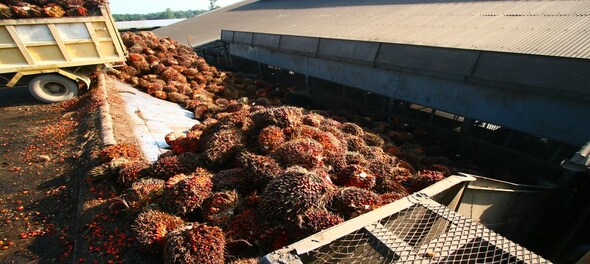
Indonesia’s decision to ban the export of palm oil from April 28 couldn’t have come at a worse time. Even before the news broke out, edible oil prices were trading at their highest prices ever — around 45 percent higher than their previous highs recorded in 2008 and then in 2011.
The hit is severe for India, which is the world’s largest importer of edible oils, and specifically is the highest importer of palm oil and soyabean oil. Edible oils and fats saw a 19 percent rise in April-March, of which five percentage points came in March alone. "The Indonesian palm oil ban may result in a further immediate 10 percent jump in prices," said Atul Chaturvedi, President of the Solvent Extractors Association.
India imports around 10.5 lakh tonnes of edible oil a month and finished FY22 with an import of 13 lakh tonnes, down from 15 lakh tonnes the previous year. Yet, India’s import bill for edible oils in FY22 jumped to Rs 1.4 lakh crore, up 72 percent from Rs 82,123 crore in FY21. Given the latest news, the worst is yet to come.
India’s monthly imports of edible oil
| Oil Variety | Quantity (in lakh tonnes) |
| Soyabean oil | 3.5 to 4.0 |
| Sunflower oil | 1.5 |
| Palm oil | 5.0 to 5.5 |
| Total | 10.5 |
Global annual palm oil output (million tonnes)
| Country | Output | Share (%) |
| Indonesia | 48-49 | 62 |
| Malaysia | 18-19 | 25 |
| Others | 9 | 13 |
| Total | 77 | 100 |
The Indonesian news has landed the global edible oils market in a perfect storm. Palm oil is the most consumed cooking oil in the world, accounting for 40 percent of global consumption, followed by Soyabean oil at 32 percent and Canola oil at 15 percent.
Global consumption of major edible oils
| Oil | Output (million tonnes) | Share (%) |
| Palm Oil | 77 | 40% |
| Soybean oil | 59 | 32% |
| Canola | 29 | 15% |
| Sunflower oil | 15.8 | 8% |
| Others* | 4 | 5% |
| Total | 185 | 100% |
In the past 12 months everything that can conceivably go wrong for edible oil crops, has. Palm oil output was hit for a better part of 2020 and 2021 in its largest growing areas of Indonesia and Malaysia due to the non-availability of migrant labour due to COVID-19.
Argentina, the largest exporter of soyabean oil, last year reported a poor soya crop. The country halted exports briefly and then resumed the same after hiking the export tax to 33 percent from 31 percent.
To add to the woes, Canada and Europe, the largest producers of canola oil, reported crop damage. So in February, when Russia started its war against Ukraine, stopping sunflower oil exports, cooking oil prices were already at historic highs. The war and the sanctions made it worse.
Edible Oils – The Perfect storm
| *Latest news: Indonesia to ban palm oil exports from April 28, due to high prices |
| *Global palm oil output slumped in 2020 & 2021 due to a drop in migrant labour in Indonesia, Malaysia |
| *Argentina to ship less soyabean oil this year due to poor harvest; had briefly halted sales overseas |
| *Argentina hikes export tariffs on soyabean oil and meal by 30-33 percent |
| *Canada & Europe reported poor canola crops in 2021 due to crop damage |
| *Ukraine, Russia largest supplier of sunflower oil have not been exporting since February |
The tragedy is that the cooking oil inflation is coinciding with a general spike in the prices of crude oil and gas, as also other commodities such as wheat, nickel, copper, and palladium, where Russia is the chief exporter. India’s own consumer price index (CPI) hit a 17-month high of 6.95 percent in March, with edible oils contributing significantly with a 19 percent rise.
Hopes that the March CPI of 6.95 percent may be a peak, were already dashed by the stickiness in crude oil prices. The latest spurt in edible oils due to the Indonesian ban may well mean that the average inflation for the year may work out to 7 percent.
Also Read: How bad can crude oil prices get?
(Edited by : Shloka Badkar)
First Published: Apr 24, 2022 5:54 PM IST
Check out our in-depth Market Coverage, Business News & get real-time Stock Market Updates on CNBC-TV18. Also, Watch our channels CNBC-TV18, CNBC Awaaz and CNBC Bajar Live on-the-go!


Lok Sabha elections 2024: From Wayanad to Shivamogga, key battles in the second phase
Apr 25, 2024 2:01 PM
EC probes allegations of MCC violation by Modi, Rahul; seeks response by April 29
Apr 25, 2024 1:32 PM
LS polls phase 2: Rahul Gandhi, Shashi Tharoor in fray; Hema Malini, Om Birla eyeing hat-trick
Apr 25, 2024 12:19 PM
UP constituencies to witness three-cornered fight in second phase tomorrow
Apr 25, 2024 10:47 AM

